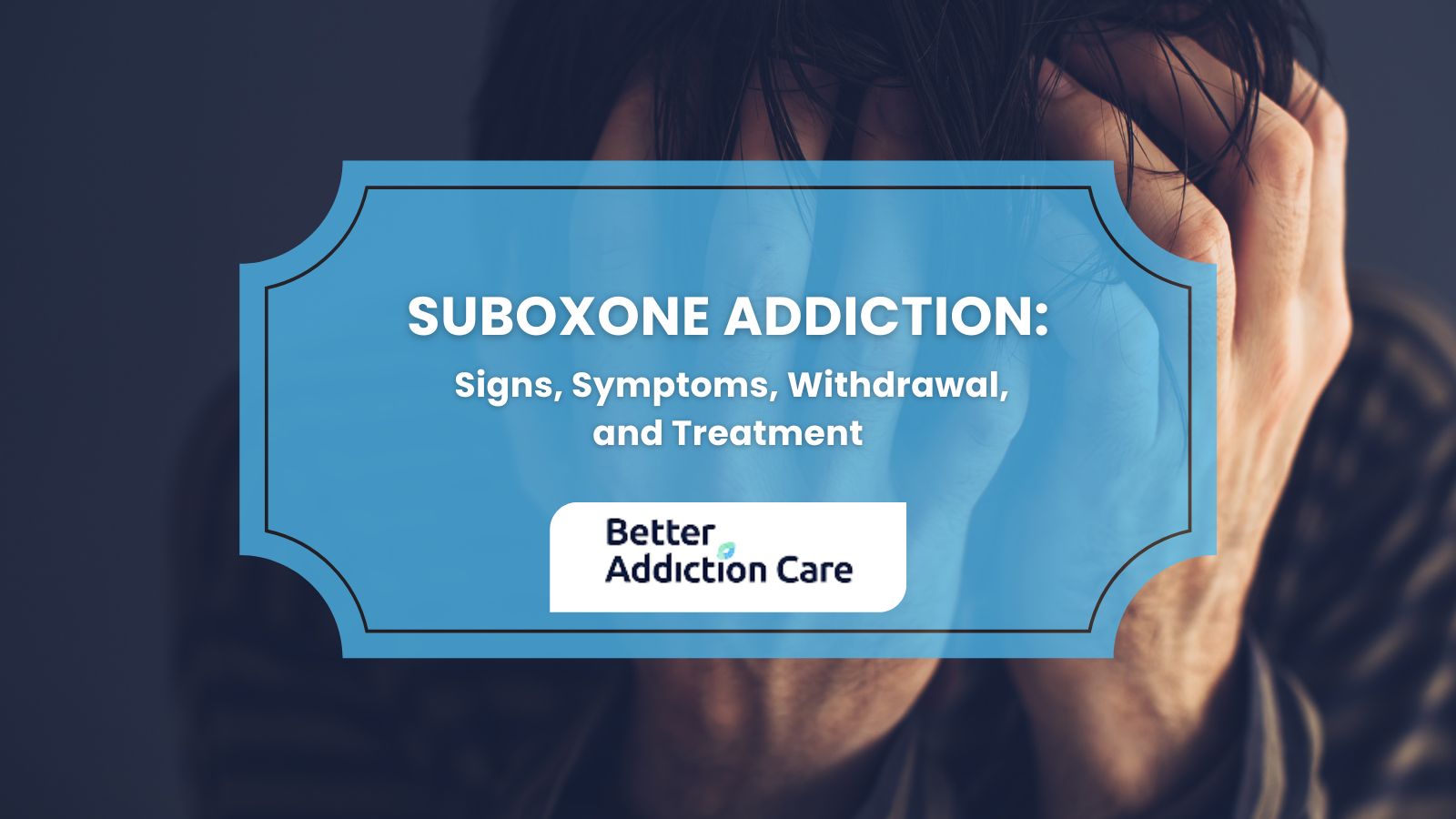39 Best Alcohol and Drug Rehabs in Rhode Island 2025
Individuals seeking addiction recovery in Rhode Island have access to 39+ drug rehab centers offering comprehensive treatment options. Our directory features a diverse selection of inpatient and outpatient facilities, detox centers, and medication-assisted treatment (MAT) programs to support lasting recovery.
Explore various rehab options, compare services, and find a facility that meets your specific needs. Whether you need medical detox, evidence-based therapy, or a long-term recovery plan, this resource connects you with reputable providers in Rhode Island.
39 Treatment Centers in Rhode Island, US
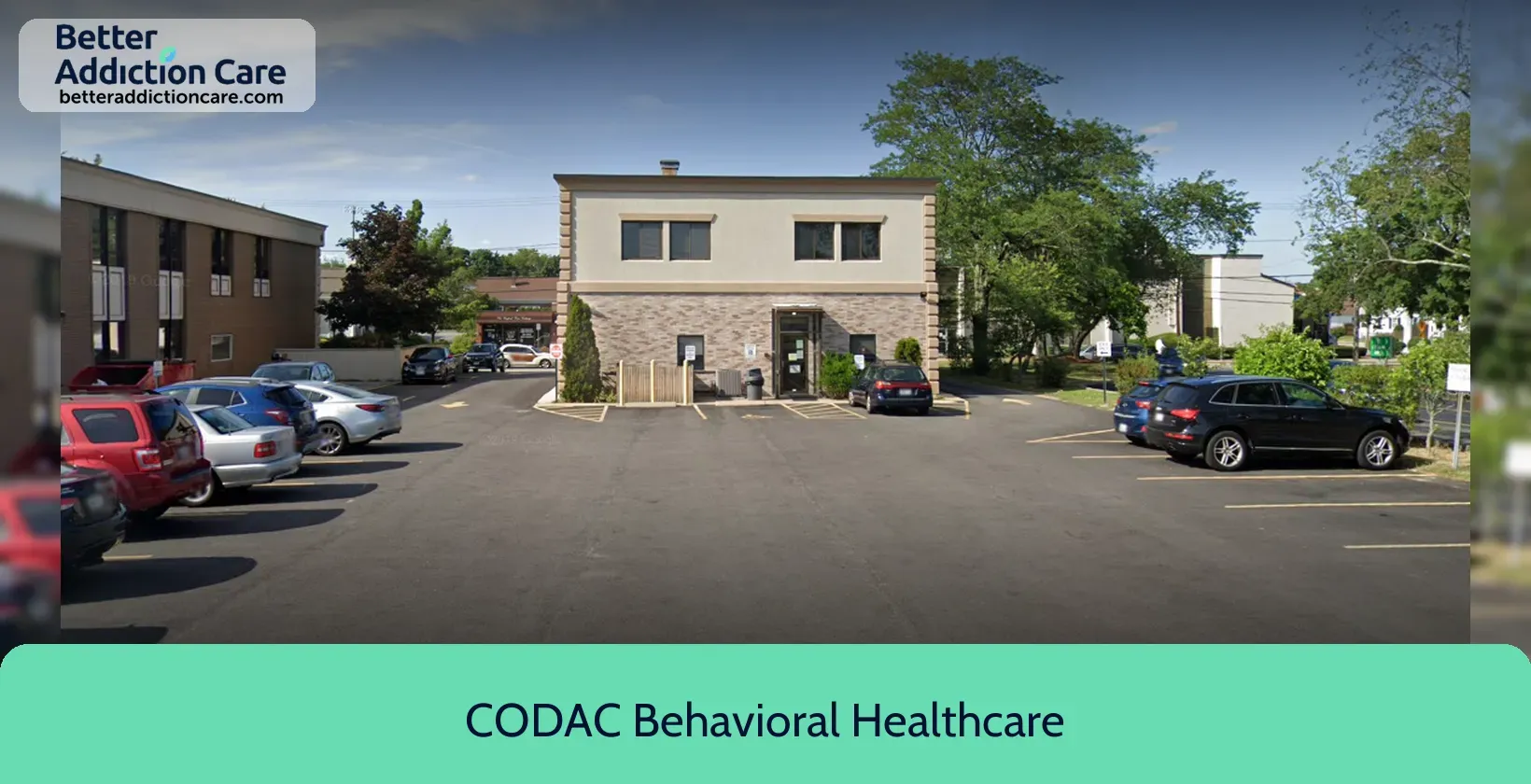
7.71
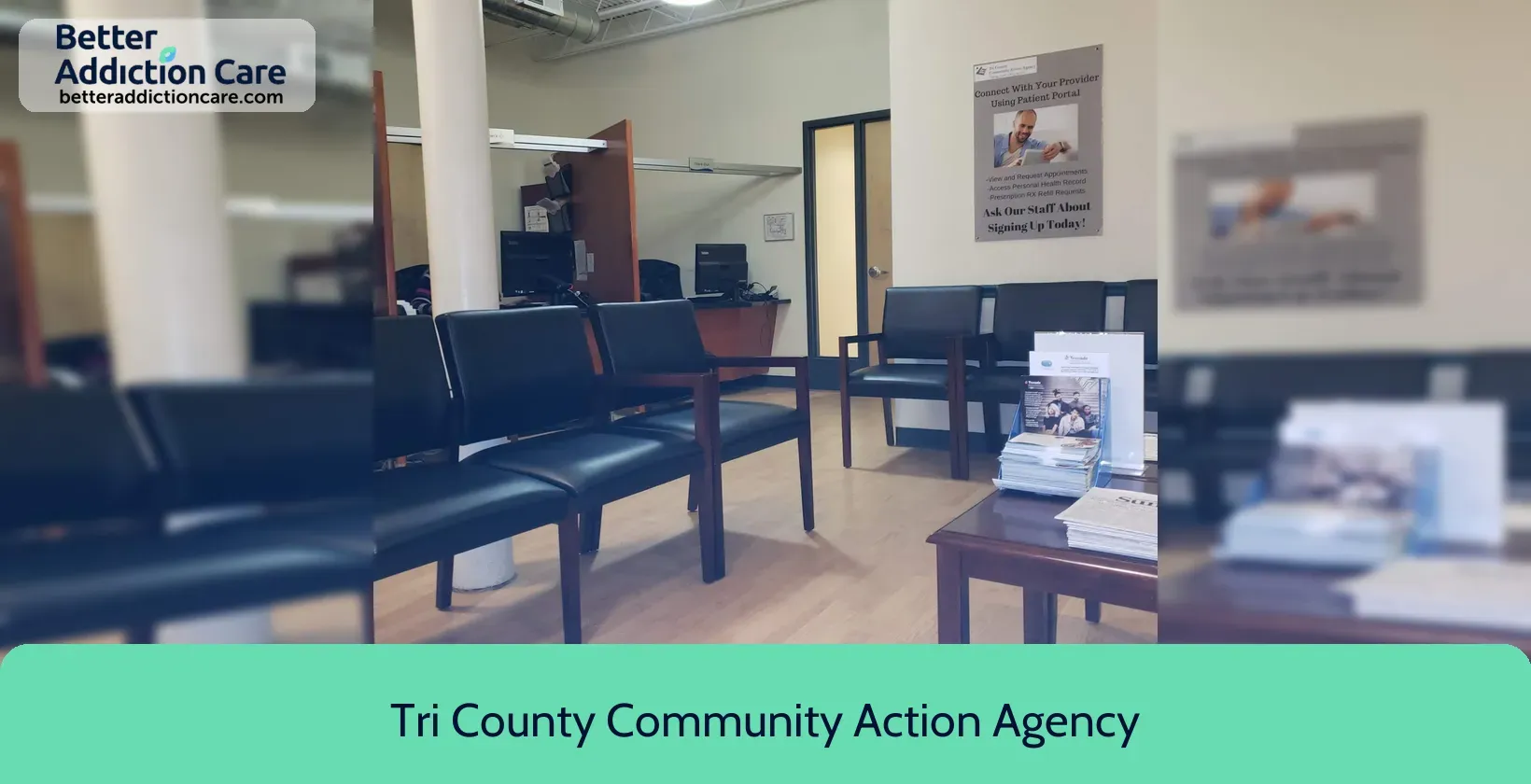
7.37
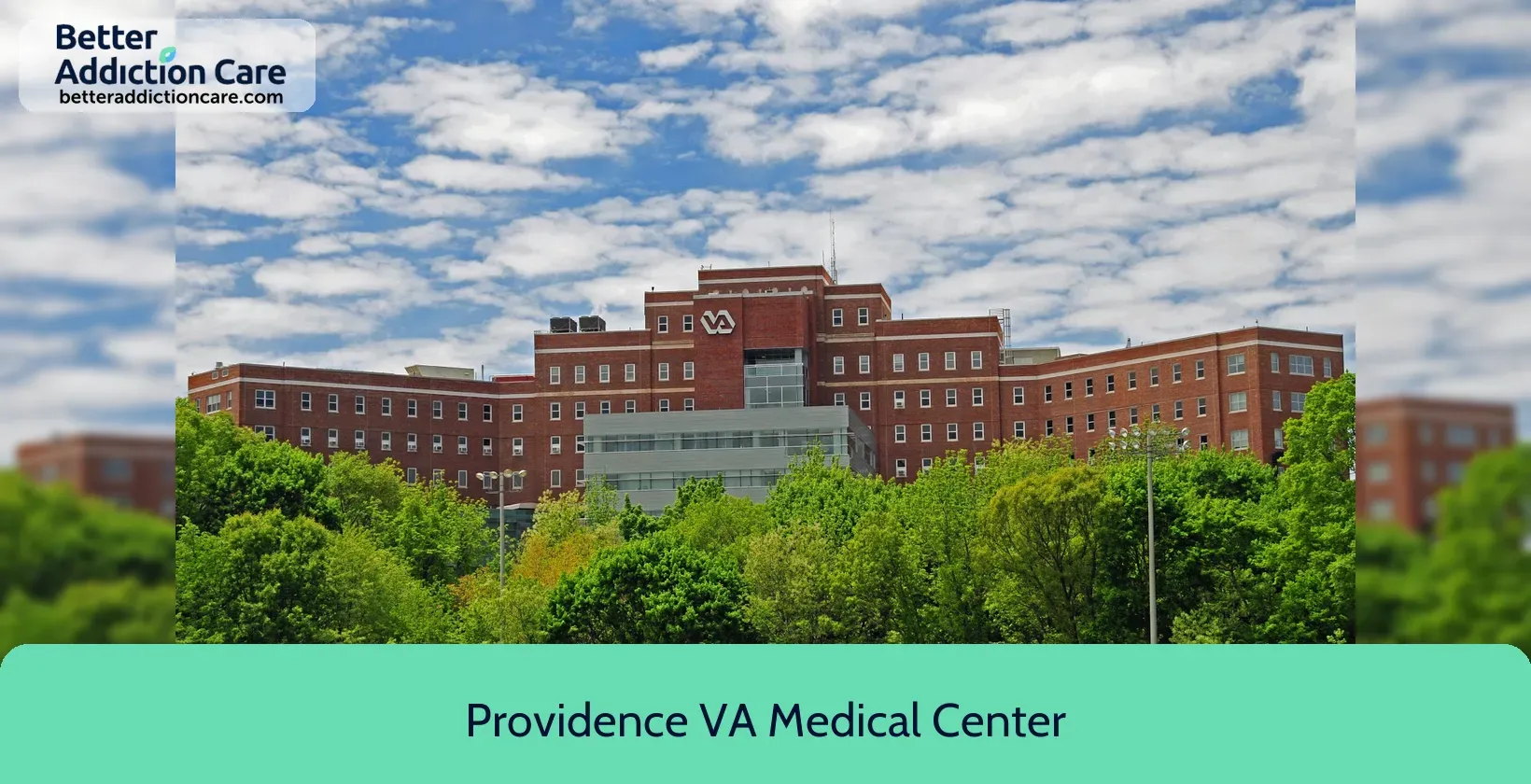
7.52

6.90

7.21

6.71
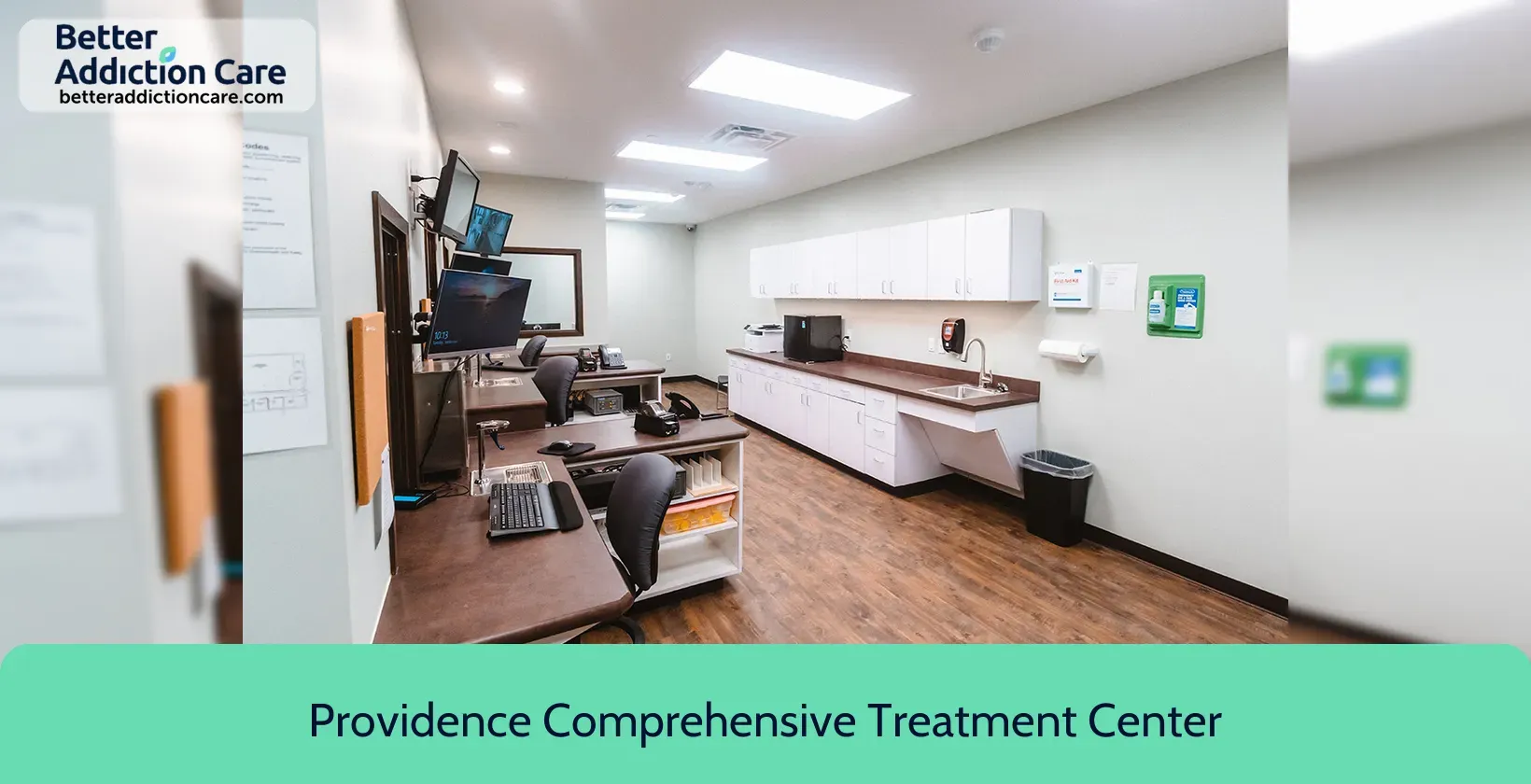
7.26
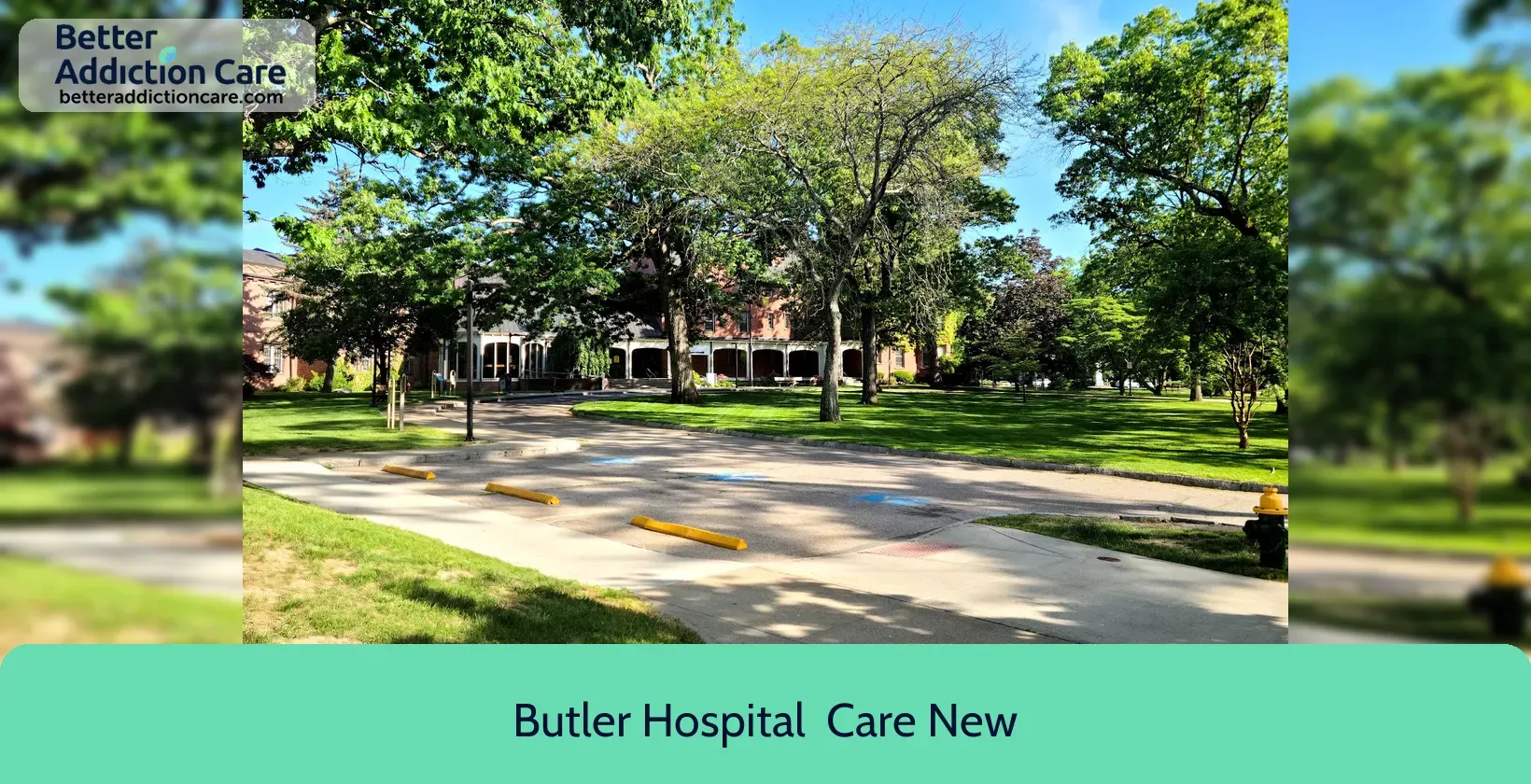
7.19
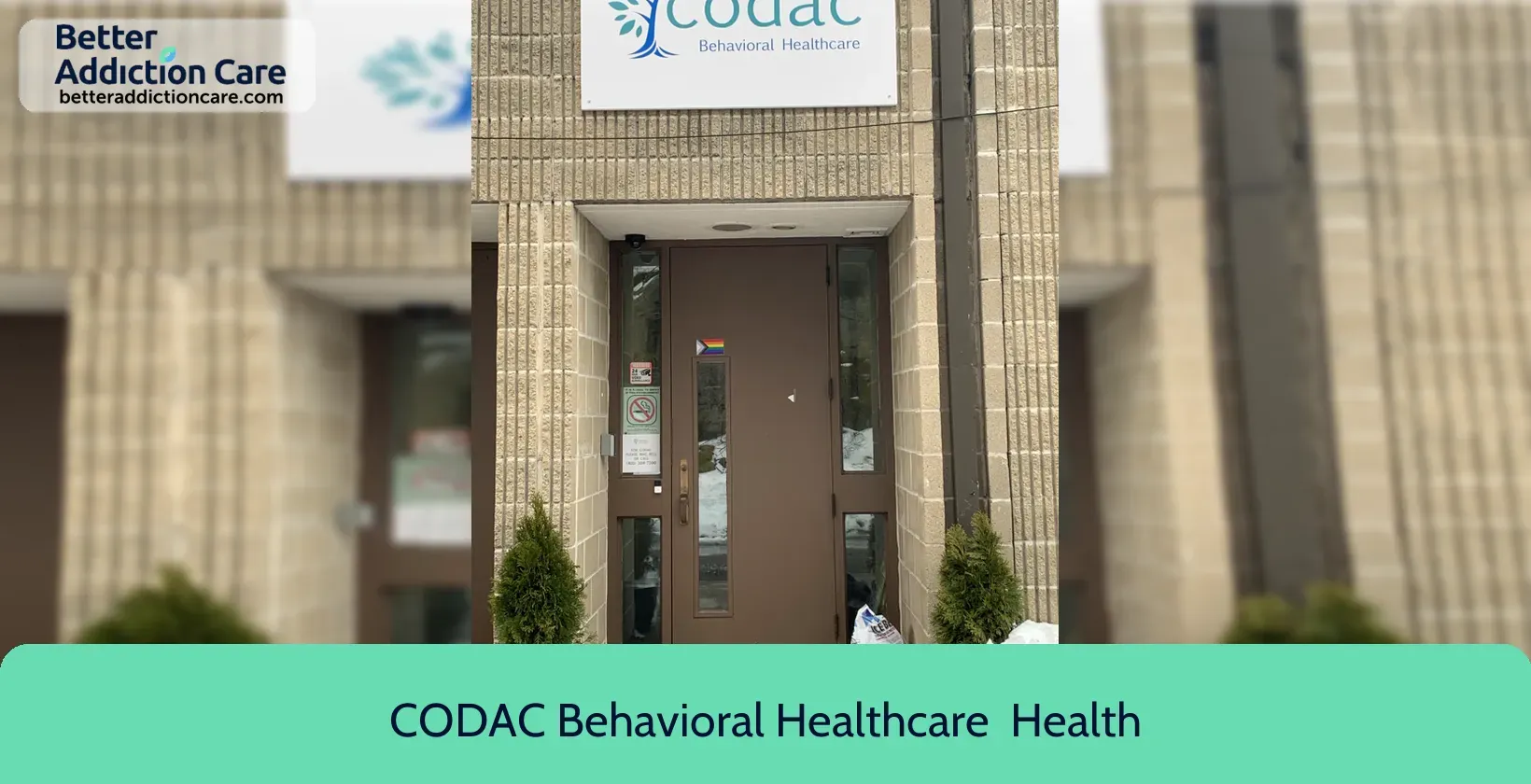
6.77
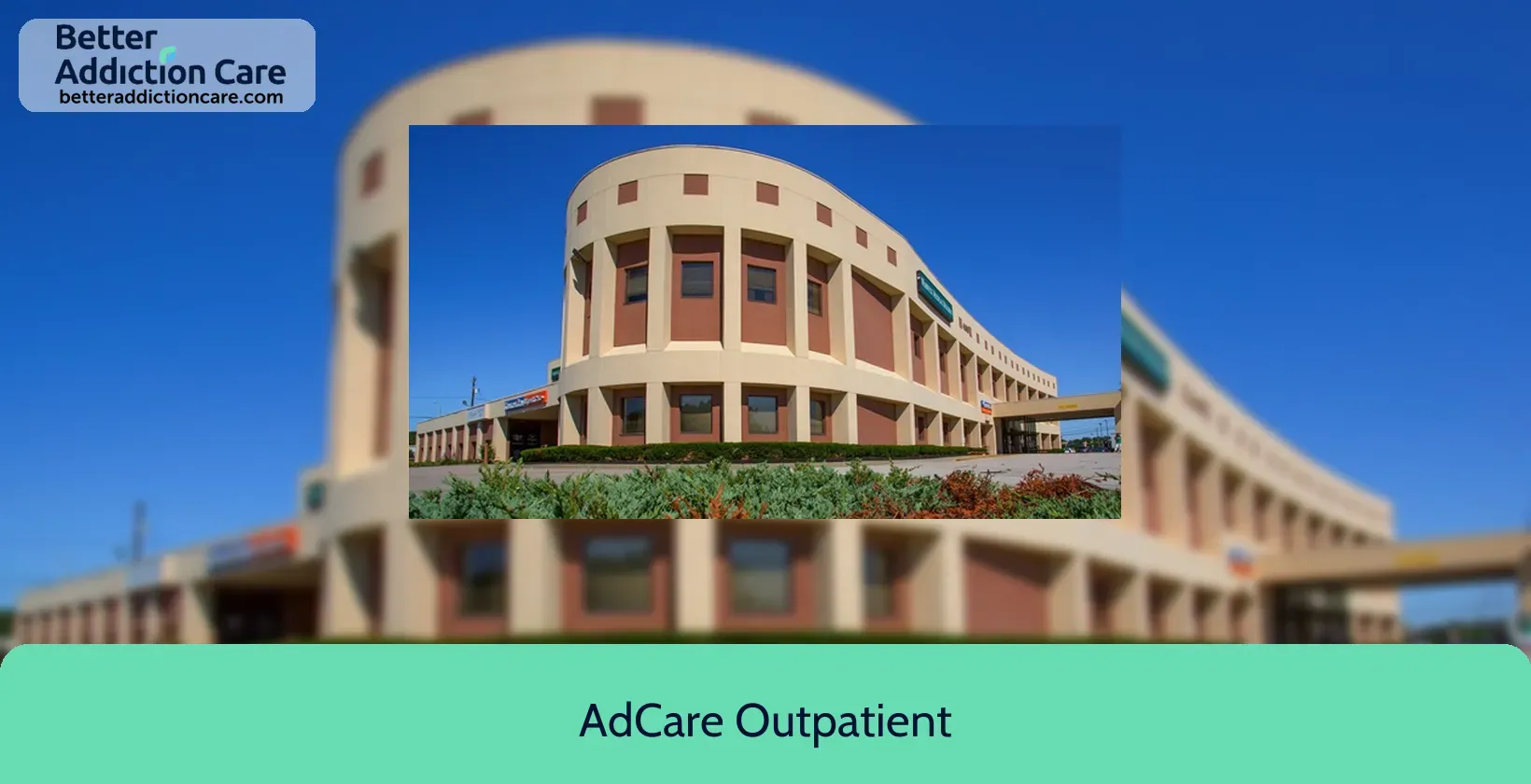
6.89
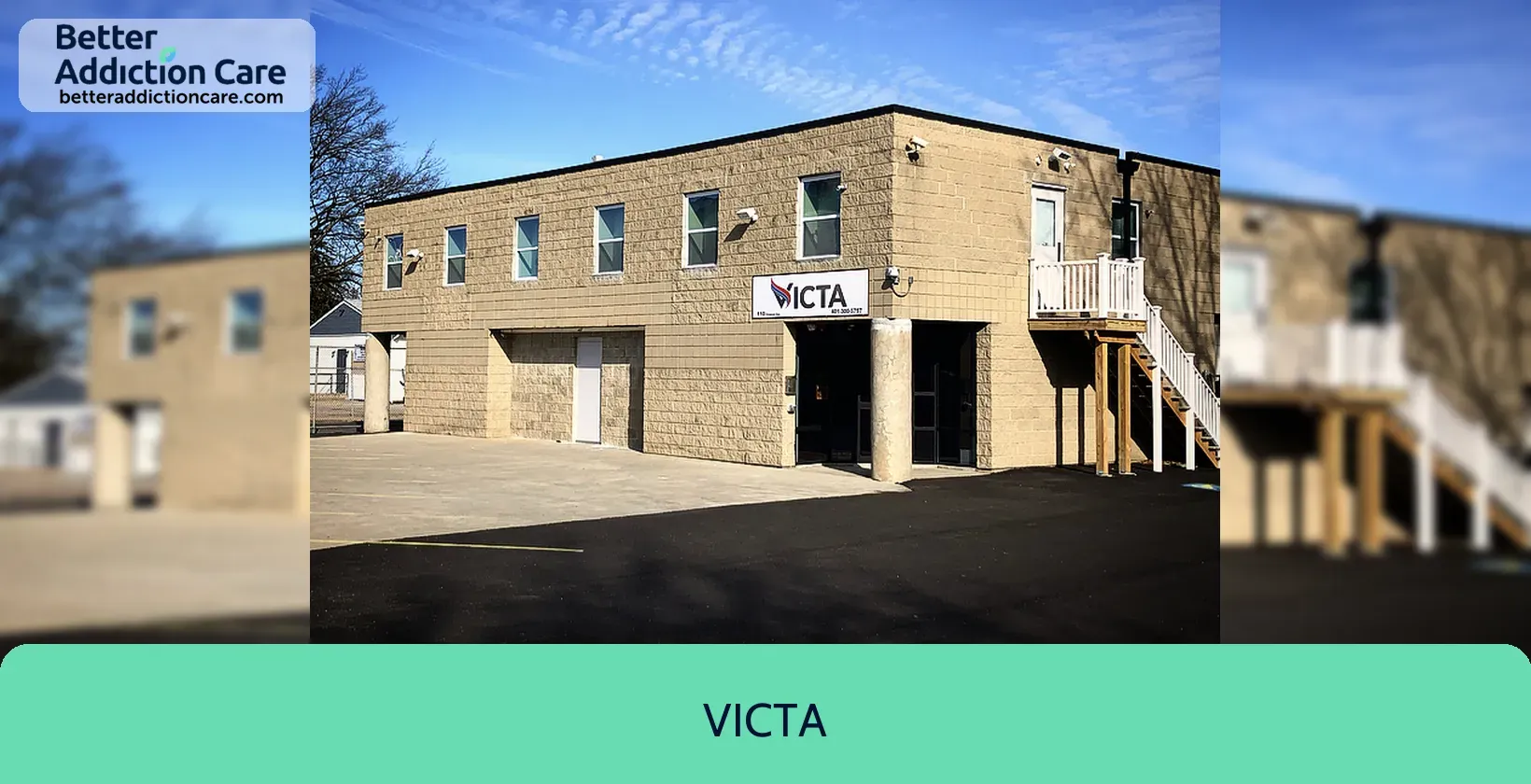
7.97
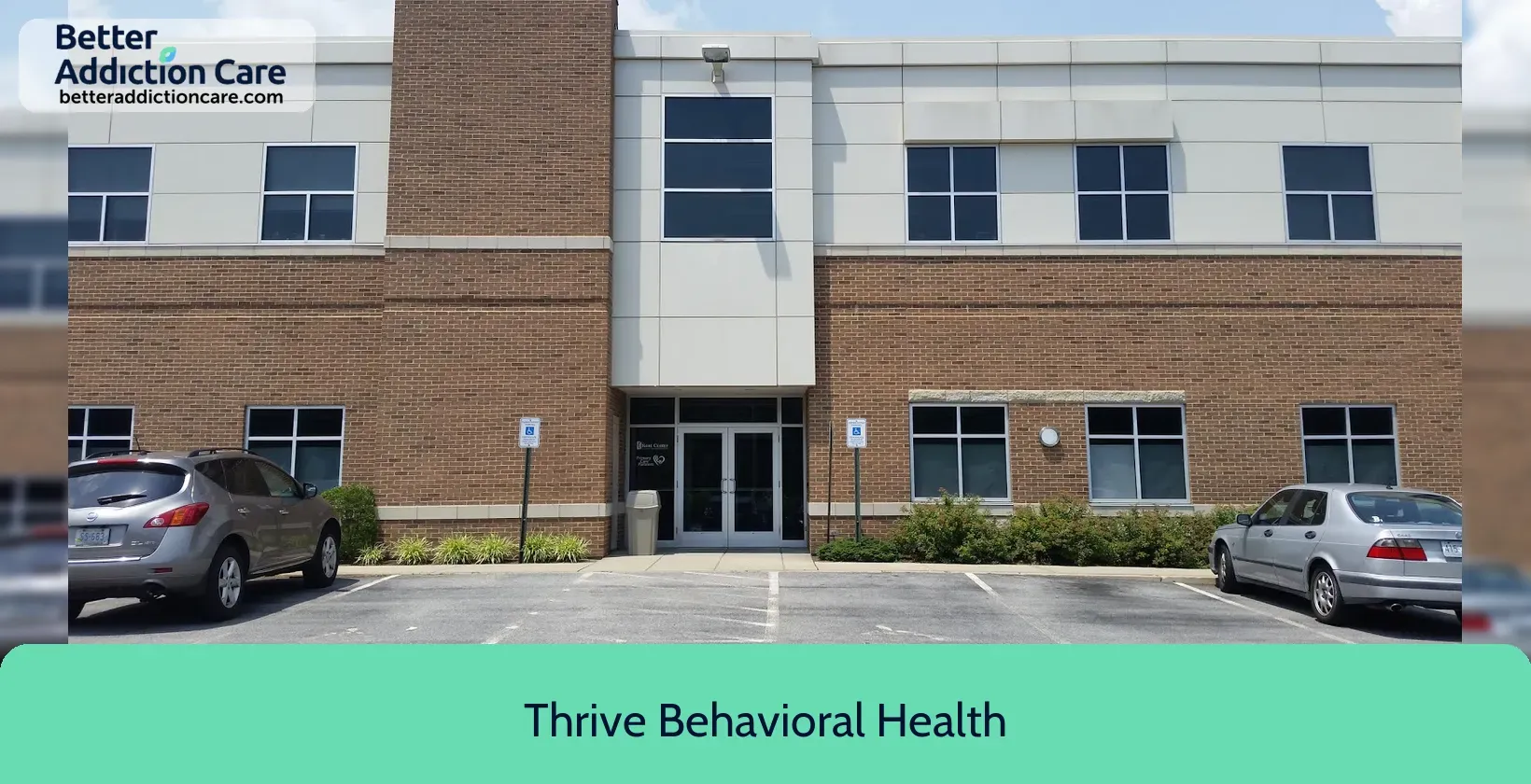
6.80
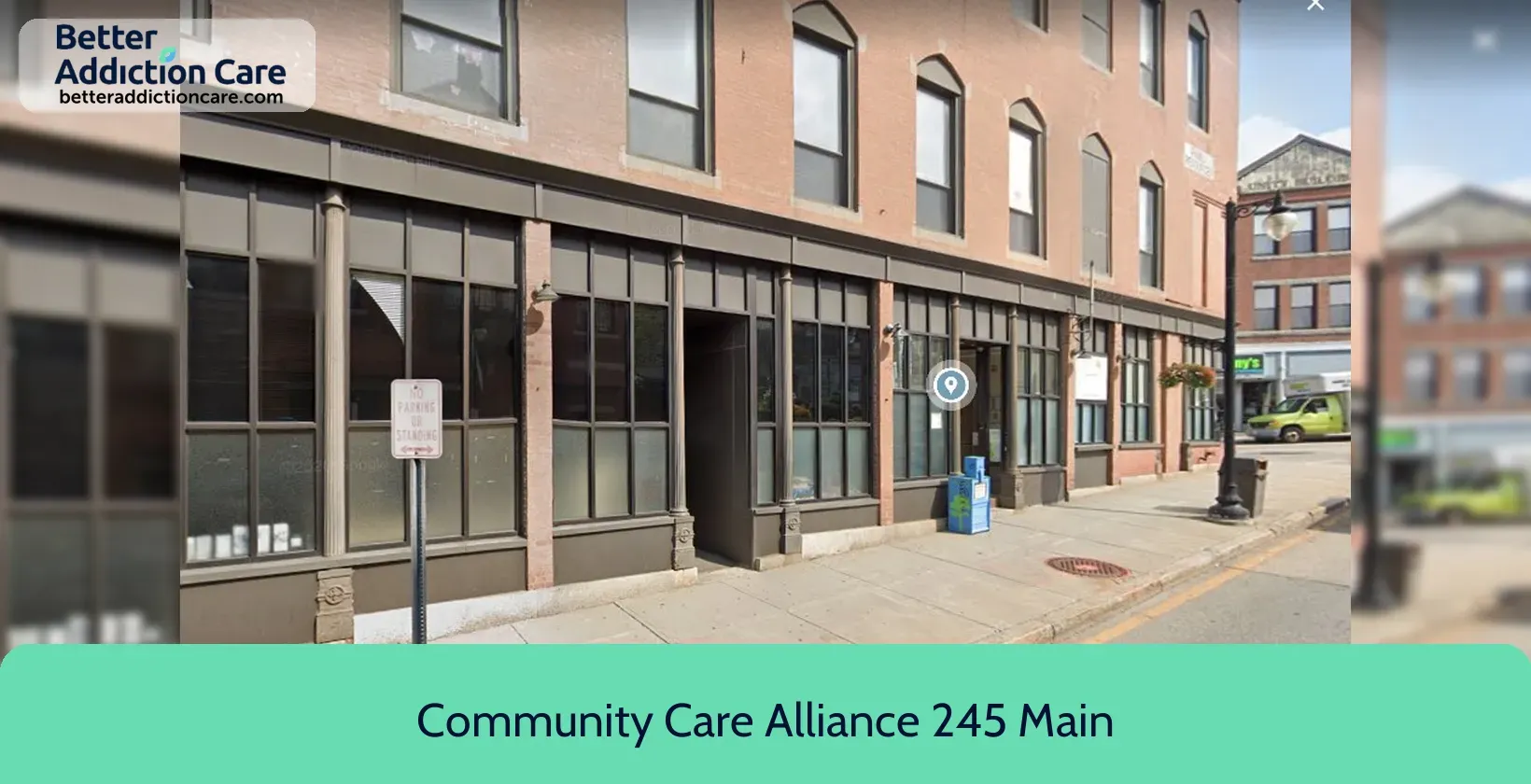
6.94
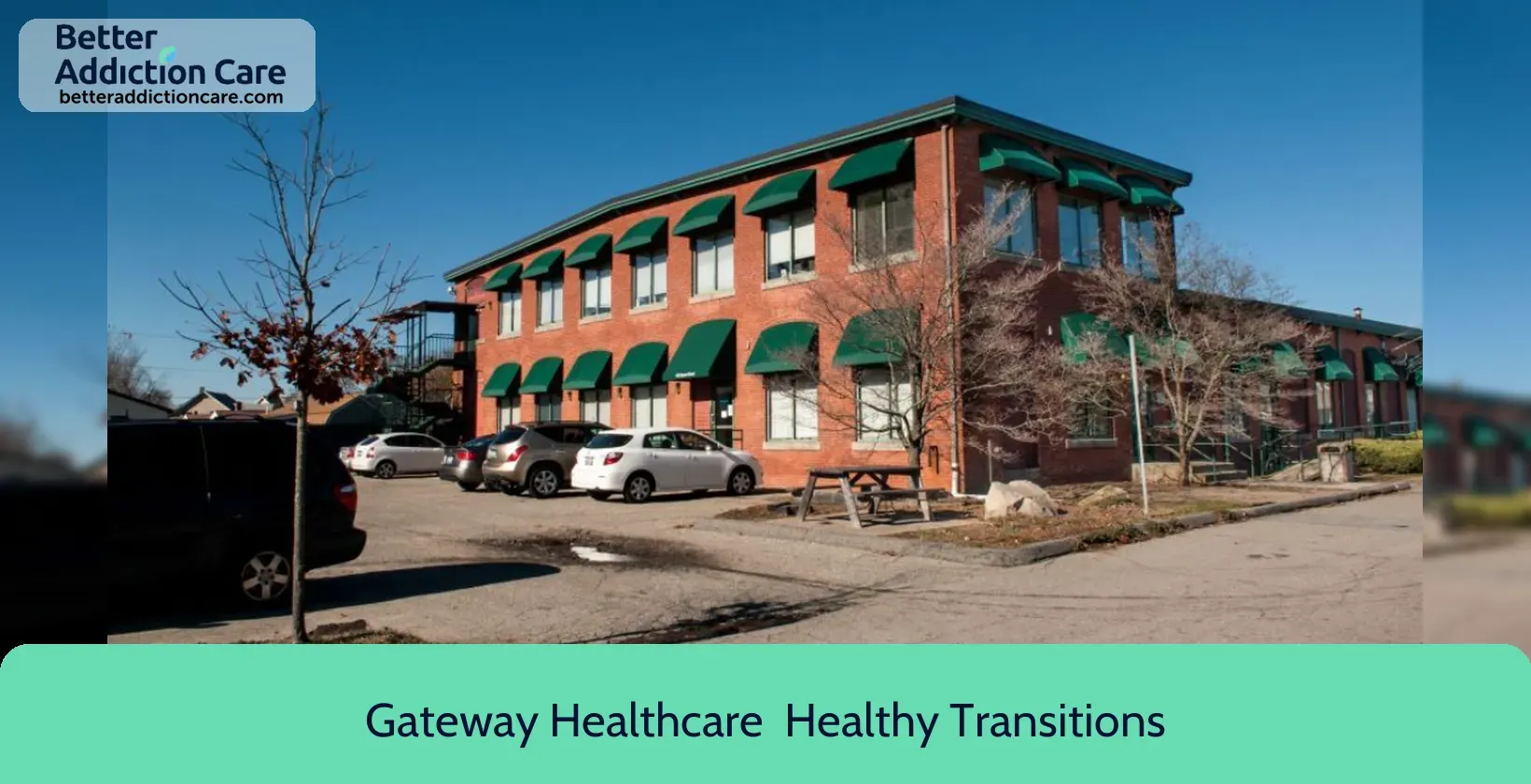
6.59
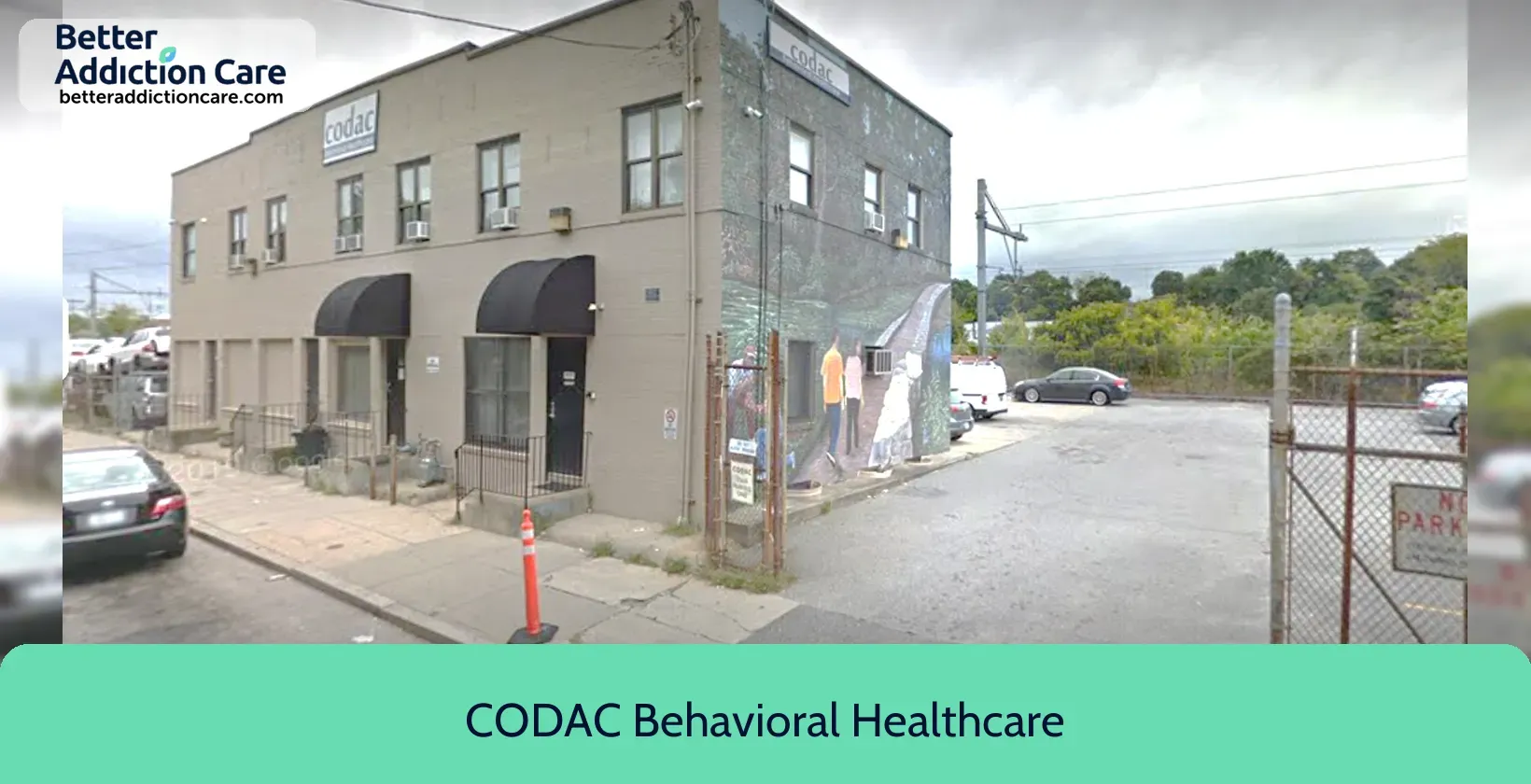
7.50
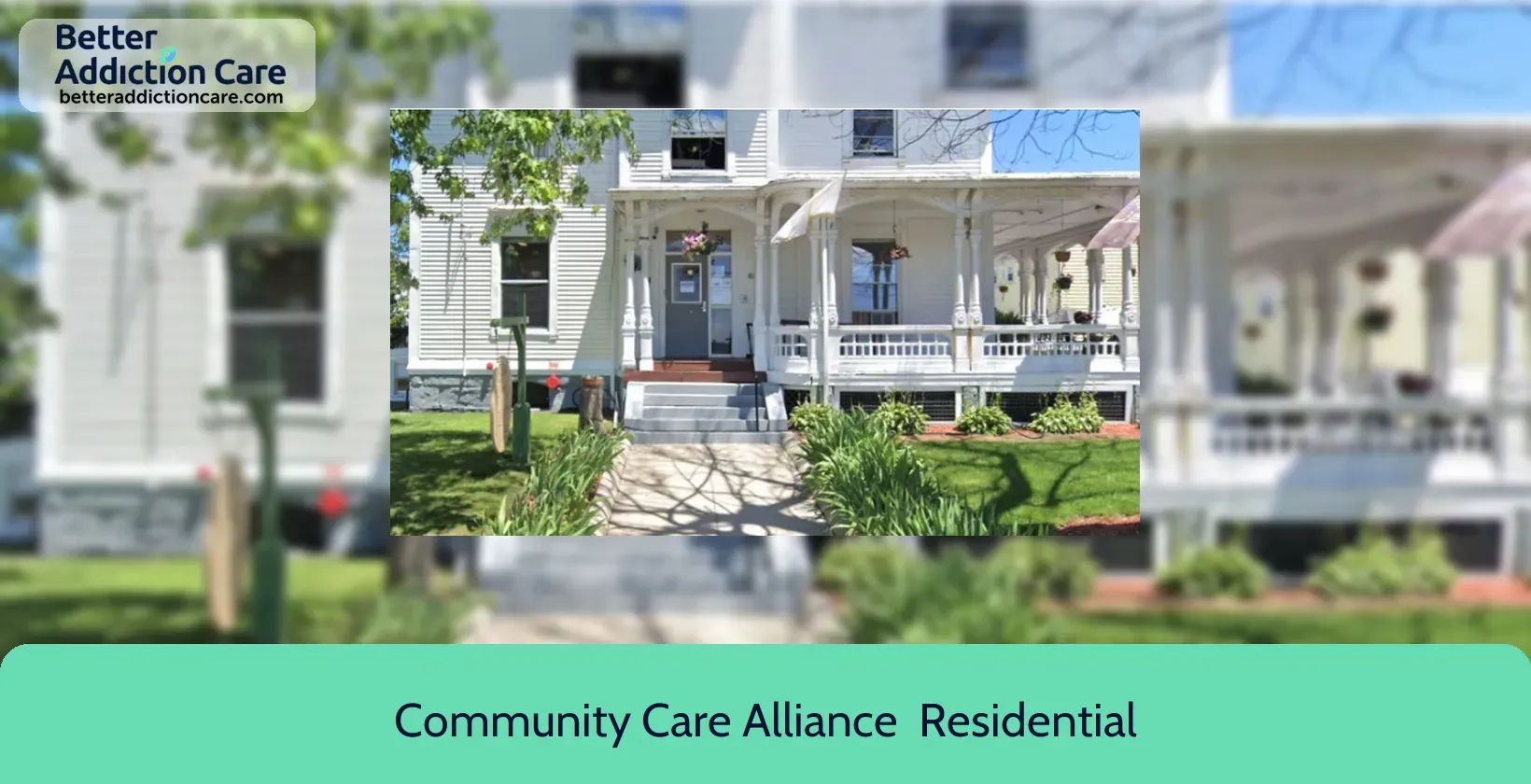
6.92
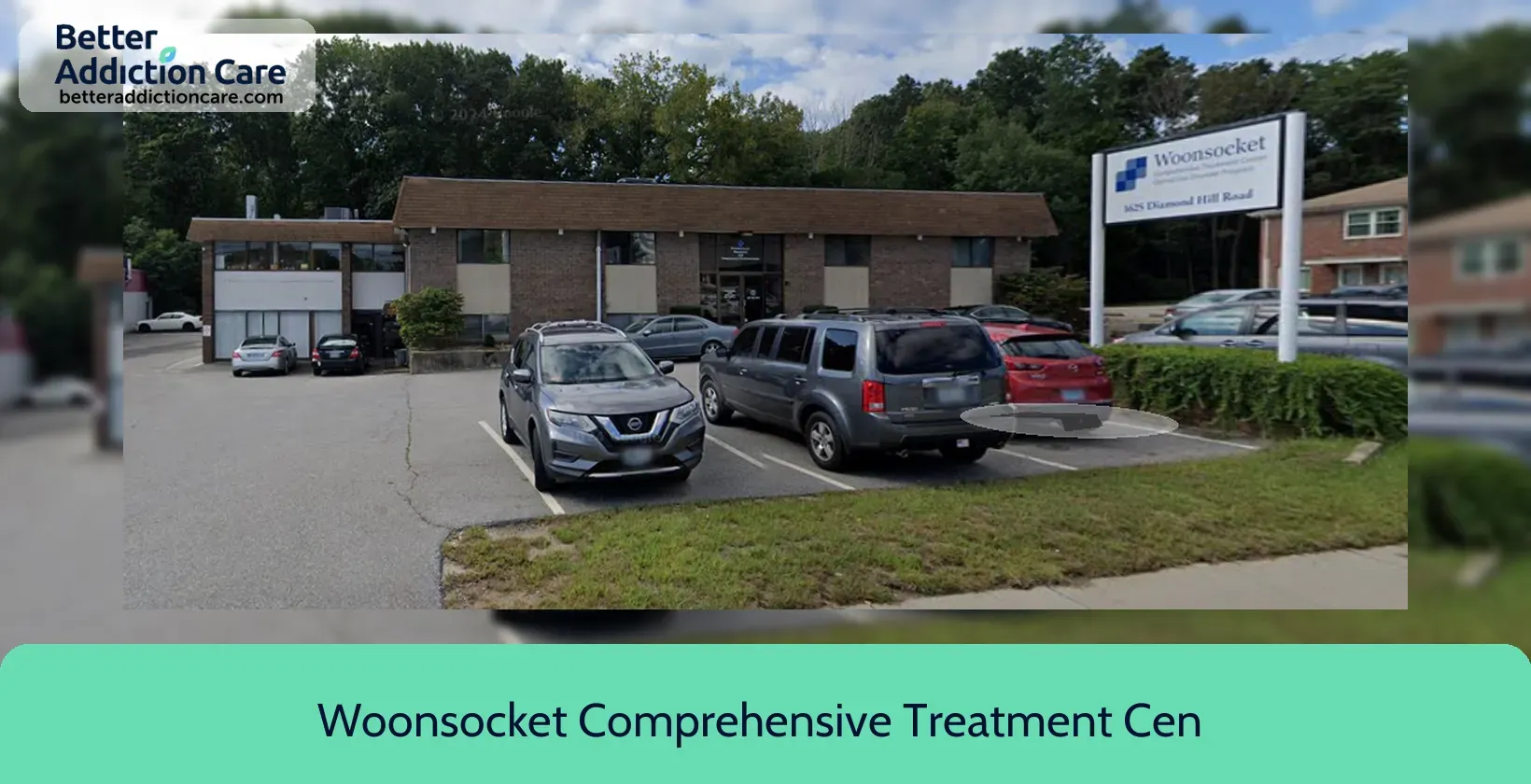
7.05

6.94

6.69

7.57

6.59

7.45

6.94

7.44

7.41

6.94

6.71

6.93

7.62

7.82

7.82

7.05

6.71

6.56

7.39

7.27

6.99

6.99

6.81
Substance abuse and Mental Health facilities Report for Rhode Island
39th
Cheapest To Most Expensive State Rank
61
Substance Abuse Facilities
8,609
Number of Patients Annually
8,286
Annual Enrollments
$13M
Spent on Outpatient Services (Million)
$1,673.00
Avg Outpatient Rehab Cost
265
Residential Admissions
$15M
Spent on Residential Treatment (Million)
$58,755.00
Residential Rehab Pay (Up To)
58
Total Patients
No
Free Drug Rehab Facilities
Alcoholism, Drug Abuse, Mental Health, and Treatment in Rhode Island
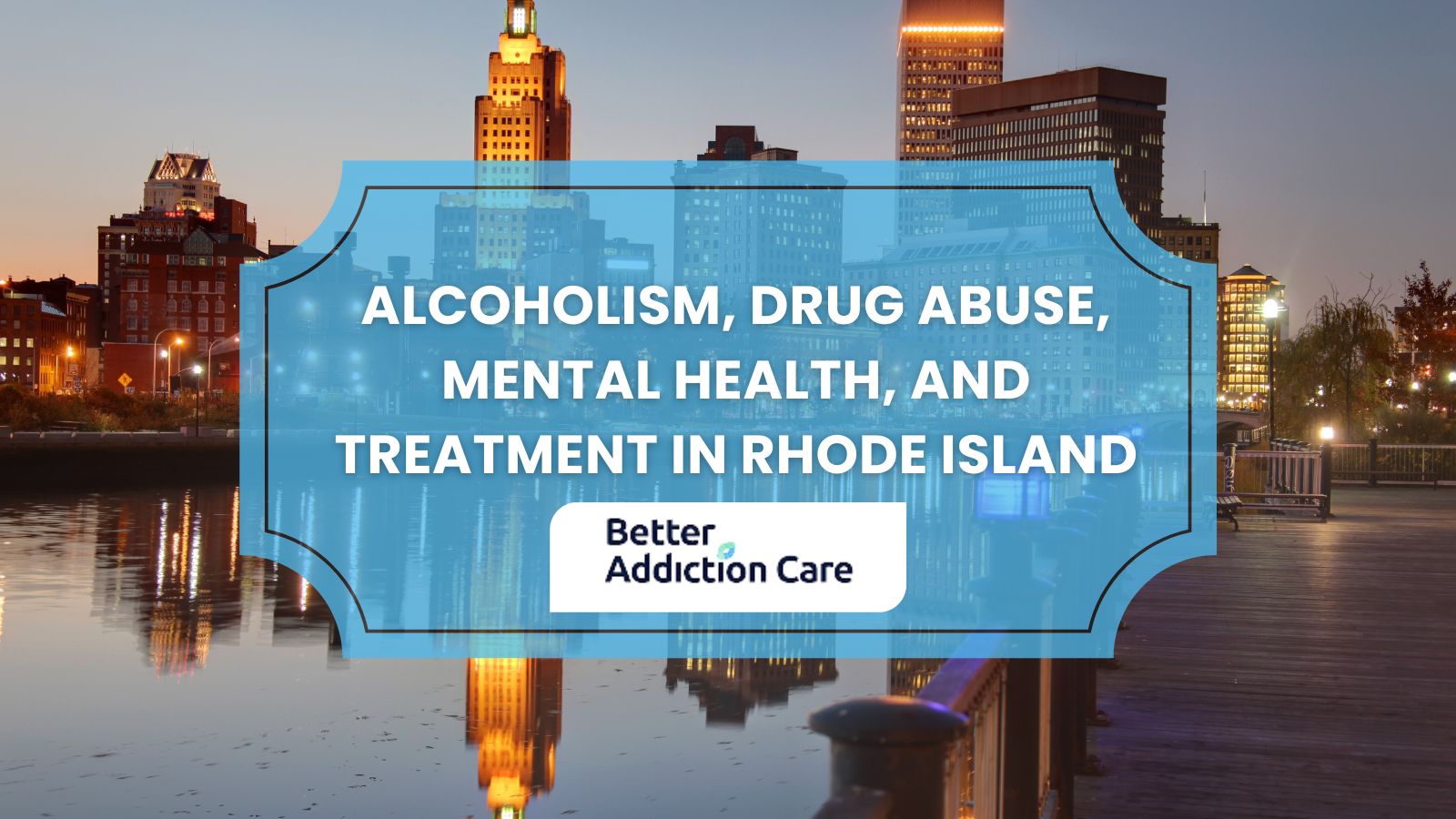
What are the main addictions people in Rhode Island suffer from?
The main addictions people in Rhode Island suffer from include;
- Alcohol Addiction: 103,000 individuals (10.9% of the population) experienced alcohol addiction. This includes 3,000 adolescents aged 12-17 (3.4%), 20,000 young adults aged 18-25 (16.2%), and 81,000 adults aged 26 or older (10.8%). 60,770 (59%) males are higher in number as compared to 42,230 (41%).
- Drug Addiction: 97,000 individuals (10.3%) had a drug addiction. This encompasses 8,000 adolescents aged 12-17 (10.2%), 26,000 young adults aged 18-25 (20.9%), and 64,000 adults aged 26 or older (8.5%). 52,380 (54%) males are higher in number as compared to 44,620 (46%).
- Opioid Addiction: 20,000 individuals (2.1%) suffered from addiction, including 1,000 adolescents aged 12-17 (0.8%), 2,000 young adults aged 18-25 (1.3%), and 18,000 adults aged 26 or older (2.4%). 13,400 (67%) males are higher in number as compared to 6,600 (33%).
- Methamphetamine Addiction: 80,000 (0.7% of the population) aged 12 or older have Methamphetamine Addiction. 52,000 (65%) males and 28,000 (35%) females reported misusing Methamphetamine.
- Marijuana Addiction: 300,000 (2.5% of the population) aged 12 or older reported misuse of Marijuana. 195,000 (65%) males and 105,000 (35%) females are affected by Marijuana addiction.
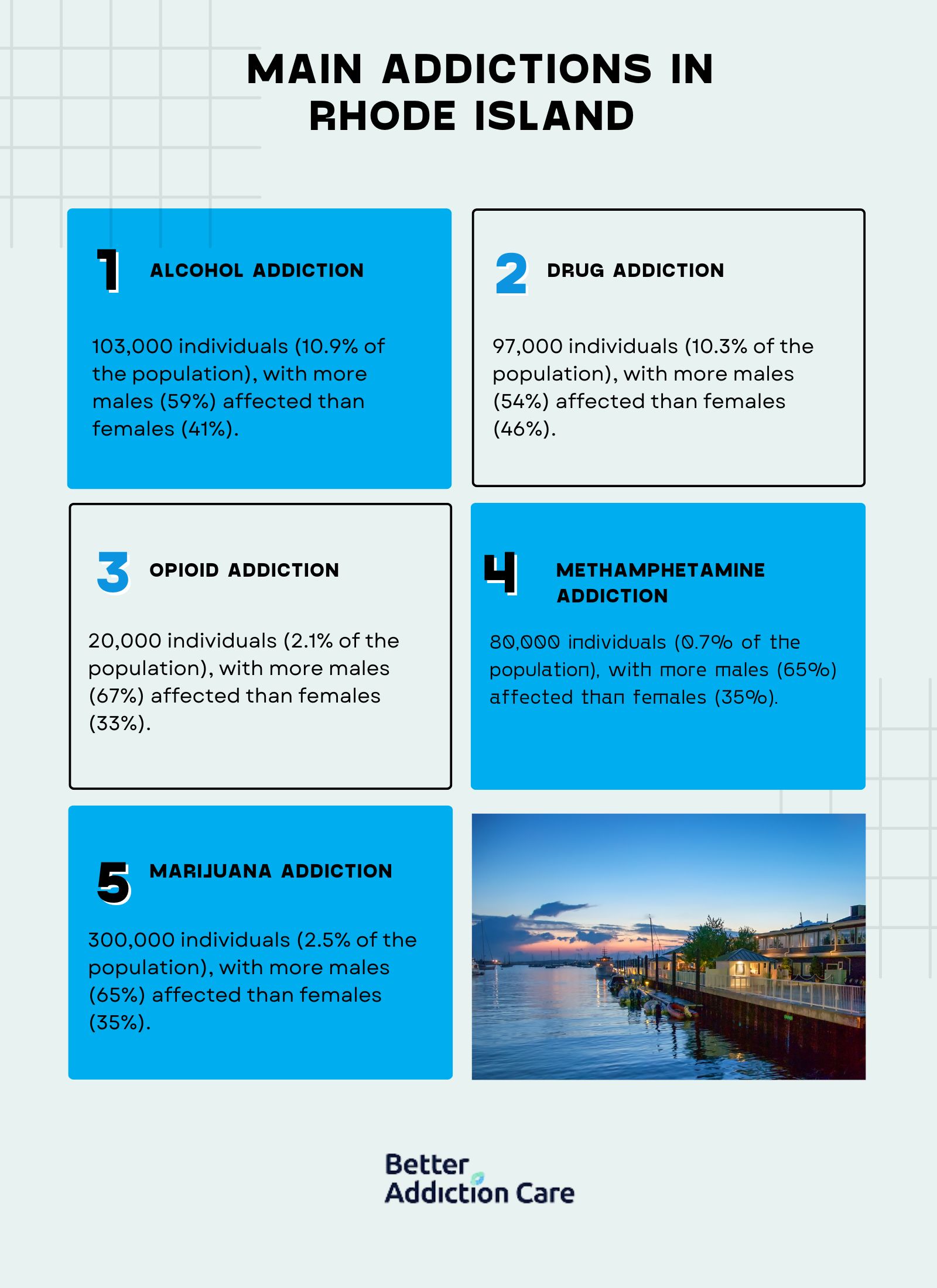
What is the cost of rehab centers in Rhode Island?
The cost of rehab centers in Rhode Island is $58,755 without insurance coverage. For inpatient rehab, the cost averages $51,848, which is slightly below the state average by $6,907, representing a decrease of 12%. In contrast, outpatient treatment is significantly more affordable, costing $8,615. This is $50,140 less than the average, translating to a reduction of nearly 85%. The cost of rehab centers reflects a range across various treatment options.
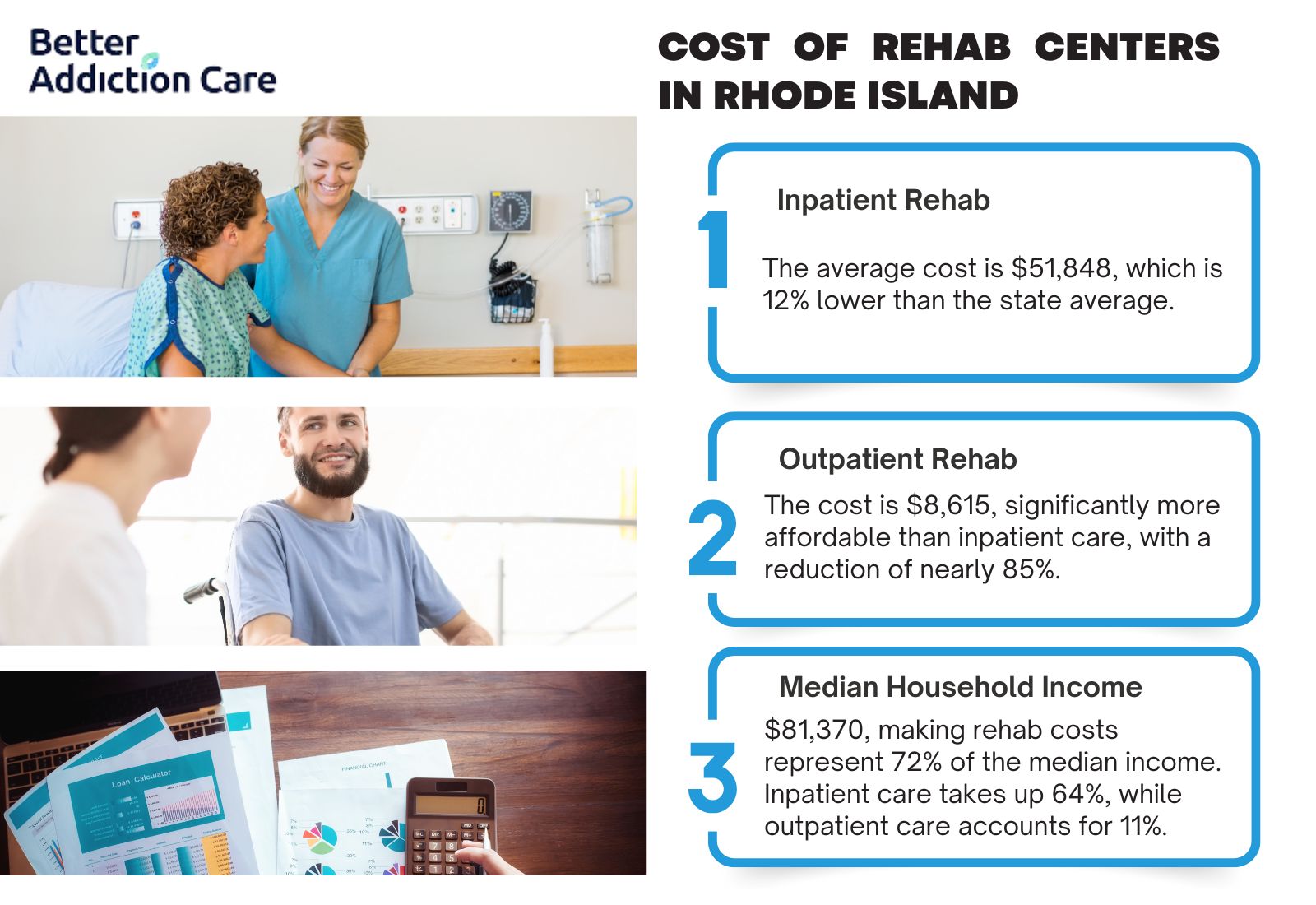
The affordability of these programs depends on the median household income in Rhode Island. The median household income of Rhode Island is $81,370. The cost of rehab centers constitute 72%. Inpatient rehab costs 64% of the median household income, whereas outpatient treatment accounts for only 11%. This shows that while outpatient services are more accessible financially, inpatient programs pose a more significant economic challenge for many families.
The cost of rehab centers vary based on the type of treatment center, with luxury facilities and specialized programs, such as medical detoxification, often costing significantly more.
What is the cost of LGBTQ+ rehab centers in Rhode Island?
The cost for LGBTQ+ rehab centers in Rhode Island is $68,000, slightly higher than the general rehab cost of $58,755. This increase reflects the additional specialized services, such as LGBTQ+ affirmative therapy and inclusive support programs. Long-term inpatient rehab for LGBTQ+ individuals costs $60,000, which is10% higher than the state average for similar services. Outpatient programs, which remain a more affordable option, average $9,500, a 10% increase compared to general outpatient treatment costs. LGBTQ+ rehab centers in Rhode Island provide specialized care tailored to the unique needs of LGBTQ+ individuals seeking recovery from substance use disorders.
The median household income in Rhode Island is $81,370, making these treatments a financial burden for many. Inpatient LGBTQ+ rehab costs 74% of the average household income, while outpatient options represent 12%. For many families, affordability depends on insurance coverage or access to financial assistance programs.
Costs of LGBTQ+ rehab centers vary significantly based on the type of facility. Luxury rehab centers or those offering highly specialized services tend to have higher costs, while standard outpatient programs are generally more affordable.
What is the cost of Faith-Based rehab centers in Rhode Island?
The cost of Faith-Based rehab centers in Rhode Island is $58,500 without insurance coverage. For inpatient rehab, the cost averages $51,848, which is slightly below the state average by $6,907, representing a decrease of 12%. In contrast, outpatient treatment is significantly more affordable, costing $8,615. This is $50,140 less than the average, translating to a reduction of nearly 85%. The cost of Faith-Based rehab centers reflects a range across various treatment options.
The affordability of these programs depends on the median household income in Rhode Island. The median household income of Rhode Island is $81,370. The cost of Faith-Based rehab centers constitute 71.8%. Inpatient rehab costs 64% of the median household income, whereas outpatient treatment accounts for only 11%. This shows that while outpatient services are more accessible financially, inpatient programs pose a more significant economic challenge for many families.
The cost of Faith-Based rehab centers vary based on the type of treatment center, with luxury facilities and specialized programs, such as medical detoxification, often costing significantly more.
What is the cost of Men-Only rehab centers in Rhode Island?
The cost of Men-Only rehab centers in Rhode Island is $58,000 without insurance coverage. For inpatient rehab, the cost averages $51,848, which is slightly below the state average by $6,907, representing a decrease of 12%. In contrast, outpatient treatment is significantly more affordable, costing $8,615. This is $50,140 less than the average, translating to a reduction of nearly 85%. The cost of Men-Only rehab centers reflects a range across various treatment options.
The affordability of these programs depends on the median household income in Rhode Island. The median household income of Rhode Island is $81,370. The cost of Men-Only rehab centers constitute 71%. Inpatient rehab costs 64% of the median household income, whereas outpatient treatment accounts for only 11%. This shows that while outpatient services are more accessible financially, inpatient programs pose a more significant economic challenge for many families.
The cost of Men-Only rehab centers vary based on the type of treatment center, with luxury facilities and specialized programs, such as medical detoxification, often costing significantly more.
What is the cost of Women-Only rehab centers in Rhode Island?
The cost of Women-Only rehab centers in Rhode Island is $57,900 without insurance coverage. For inpatient rehab, the cost averages $51,848, which is slightly below the state average by $6,907, representing a decrease of 12%. In contrast, outpatient treatment is significantly more affordable, costing $8,615. This is $50,140 less than the average, translating to a reduction of nearly 85%. The cost of Women-Only rehab centers reflects a range across various treatment options.
The affordability of these programs depends on the median household income in Rhode Island. The median household income of Rhode Island is $81,370. The cost of Women-Only rehab centers constitute 71%. Inpatient rehab costs 64% of the median household income, whereas outpatient treatment accounts for only 11%. This shows that while outpatient services are more accessible financially, inpatient programs pose a more significant economic challenge for many families.
The cost of Women-Only rehab centers vary based on the type of treatment center, with luxury facilities and specialized programs, such as medical detoxification, often costing significantly more.
What is the cost of Teen rehab centers in Rhode Island?
The cost of Teen rehab centers in Rhode Island is $57,500 without insurance coverage. For inpatient rehab, the cost averages $51,848, which is slightly below the state average by $6,907, representing a decrease of 12%. In contrast, outpatient treatment is significantly more affordable, costing $8,615. This is $50,140 less than the average, translating to a reduction of nearly 85%. The cost of Teen rehab centers reflects a range across various treatment options.
The affordability of these programs depends on the median household income in Rhode Island. The median household income of Rhode Island is $81,370. The cost of Teen rehab centers constitute 70.6%. Inpatient rehab costs 64% of the median household income, whereas outpatient treatment accounts for only 11%. This shows that while outpatient services are more accessible financially, inpatient programs pose a more significant economic challenge for many families.
The cost of Teen rehab centers vary based on the type of treatment center, with luxury facilities and specialized programs, such as medical detoxification, often costing significantly more.
What is the cost of Young Adult rehab centers in Rhode Island?
The cost of Young Adult rehab centers in Rhode Island is $57,000 without insurance coverage. For inpatient rehab, the cost averages $51,848, which is slightly below the state average by $6,907, representing a decrease of 12%. In contrast, outpatient treatment is significantly more affordable, costing $8,615. This is $50,140 less than the average, translating to a reduction of nearly 85%. The cost of Young Adult rehab centers reflects a range across various treatment options.
The affordability of these programs depends on the median household income in Rhode Island. The median household income of Rhode Island is $81,370. The cost of Young Adult rehab centers constitute 70%. Inpatient rehab costs 64% of the median household income, whereas outpatient treatment accounts for only 11%. This shows that while outpatient services are more accessible financially, inpatient programs pose a more significant economic challenge for many families.
The cost of Young Adult rehab centers vary based on the type of treatment center, with luxury facilities and specialized programs, such as medical detoxification, often costing significantly more.
What is the cost of Luxury Rehab centers in Rhode Island?
The cost of Luxury Rehab centers in Rhode Island is $50,000. The cost of Luxury Rehab centers varies significantly, ranging from $20,000 to $80,000 per month, depending on the services and accommodations provided. Standard inpatient rehab in Rhode Island averages $58,755 for a 30-day program. This means that luxury rehab centers are up to 36% more expensive than the average inpatient treatment, with costs increasing by $21,245 to $41,245. Luxury rehab centers in Rhode Island offer high-end amenities and personalized treatment plans for individuals seeking recovery from substance addictions.
The type of addiction being treated also influences the overall cost. For instance, medical detoxification, often necessary for severe substance dependencies, is among the most expensive treatments, averaging $144,853. This represents an increase of $86,098, or 146%, over the average rehab cost.
The median household income in Rhode Island is $81,370, the cost of luxury rehab centers represent a substantial financial commitment, ranging from 25% to 98% of the annual household income, depending on the facility and duration of stay. Cost of Luxury rehab center varies based on the type of facility, the specific services offered, and the duration of treatment. Luxury rehab centers provide enhanced privacy, upscale accommodations, and a higher staff-to-patient ratio, contributing to their higher costs compared to standard treatment facilities.
What is the cost of Dual Diagnosis rehab centers in Rhode Island?
The cost of Dual Diagnosis rehab centers in Rhode Island is $58,000 without insurance coverage. For inpatient rehab, the cost averages $51,848, which is slightly below the state average by $6,907, representing a decrease of 12%. In contrast, outpatient treatment is significantly more affordable, costing $8,615. This is $50,140 less than the average, translating to a reduction of nearly 85%. The cost of Dual Diagnosis rehab centers reflects a range across various treatment options.
The affordability of these programs depends on the median household income in Rhode Island. The median household income of Rhode Island is $81,370. The cost of Dual Diagnosis rehab centers constitute 71%. Inpatient rehab costs 64% of the median household income, whereas outpatient treatment accounts for only 11%. This shows that while outpatient services are more accessible financially, inpatient programs pose a more significant economic challenge for many families.
The cost of Dual Diagnosis rehab centers vary based on the type of treatment center, with luxury facilities and specialized programs, such as medical detoxification, often costing significantly more.
Is drug abuse and addiction a problem in Rhode Island?
Yes, drug abuse and addiction is a problem in Rhode Island. Firstly, Rhode Island has experienced a substantial increase in drug overdose deaths over the years. In 2024, fentanyl and other synthetic opioids were involved in 72% of total overdose deaths, with rates increasing nearly tenfold between 2013 and 2024. Secondly, the prevalence of illicit drug use remains high. In 2023, 19.76% of individuals aged 12 or older reported using illicit drugs in the past month. Thirdly, the state of Rhode Island has seen a rise in drug-only treatment admissions, doubling from 21% in 1996 to 46% in 2012, indicating an increasing need for substance abuse treatment services. These trends highlight the growing challenges Rhode Island faces in addressing drug abuse and addiction.
Is alcoholism a problem in Rhode Island?
Yes, alcoholism is a problem in Rhode Island. Firstly, Rhode Island has consistently reported higher rates of alcohol consumption compared to national averages. Between 2019 and 2024, 61.8% to 60.8% of Rhode Island adults reported drinking alcohol in the past 30 days, exceeding the U.S. median by 5.5% to 7% during these years. Secondly, excessive alcohol use has led to substantial health consequences. From 2019 to 2024, it contributed to 500 deaths annually in the state, shortening the lives of those who died by nearly 25 years on average. Thirdly, binge drinking remains prevalent, particularly among younger adults. In 2024, 18.0% of Rhode Island adults reported excessive drinking, with higher prevalence among men and minority groups. These statistics highlight the persistent and evolving challenges posed by alcohol misuse in Rhode Island over the years.
Is Mental Health a problem in Rhode Island?
Yes, mental health is a problem in Rhode Island. Firstly, the state of Rhode Island has witnessed a notable increase in mental health service utilization. From 2019 to 2024, spending on mental health office visits for commercially insured residents rose significantly across all age groups, with utilization rates increasing by 44% to 70%, indicating a growing demand for mental health services. Secondly, the prevalence of frequent mental distress among adults has escalated.
Since 2018, there has been a rising trend in the number of adults experiencing frequent mental distress, with higher rates observed among young adults aged 18-24 and multiracial populations. Thirdly, suicide rates have increased over the past two decades. The age-adjusted suicide rate in Rhode Island has risen by 34.2% over the past 20 years, reflecting a concerning trend in mental health outcomes. These statistics underscore the escalating mental health challenges in Rhode Island, highlighting the need for enhanced mental health services and support systems.
Can you travel to Rhode Island for rehab?
Yes, you can travel to Rhode Island for rehab, and the state of Rhode Island offers several compelling reasons for individuals seeking treatment. Firstly, Rhode Island boasts some of the highest-quality rehab centers in the country, with specialized programs tailored to diverse needs, including gender-specific, LGBTQ+, and faith-based options. These facilities often provide personalized care plans and access to advanced therapies.
Secondly, Rhode Island's compact size ensures easy access to a variety of scenic locations, including coastal settings and tranquil countryside, which create a calming environment conducive to recovery. Thirdly, Rhode Island has a strong network of support services, including community-based programs and outpatient options, which allow for a seamless transition from intensive care to ongoing recovery. These features make Rhode Island a unique and advantageous destination for rehab.
Can addiction be treated in Rhode Island?
Yes, addiction can be treated in Rhode Island due to its comprehensive and accessible resources. Firstly, the state of Rhode Island is home to a wide array of specialized rehab centers offering evidence-based treatments, such as medication-assisted therapy and behavioral counseling, tailored to meet individual needs. Secondly, Rhode Island has robust state-supported initiatives like the BH Link crisis center and harm reduction programs, ensuring immediate access to care and support for those in need.
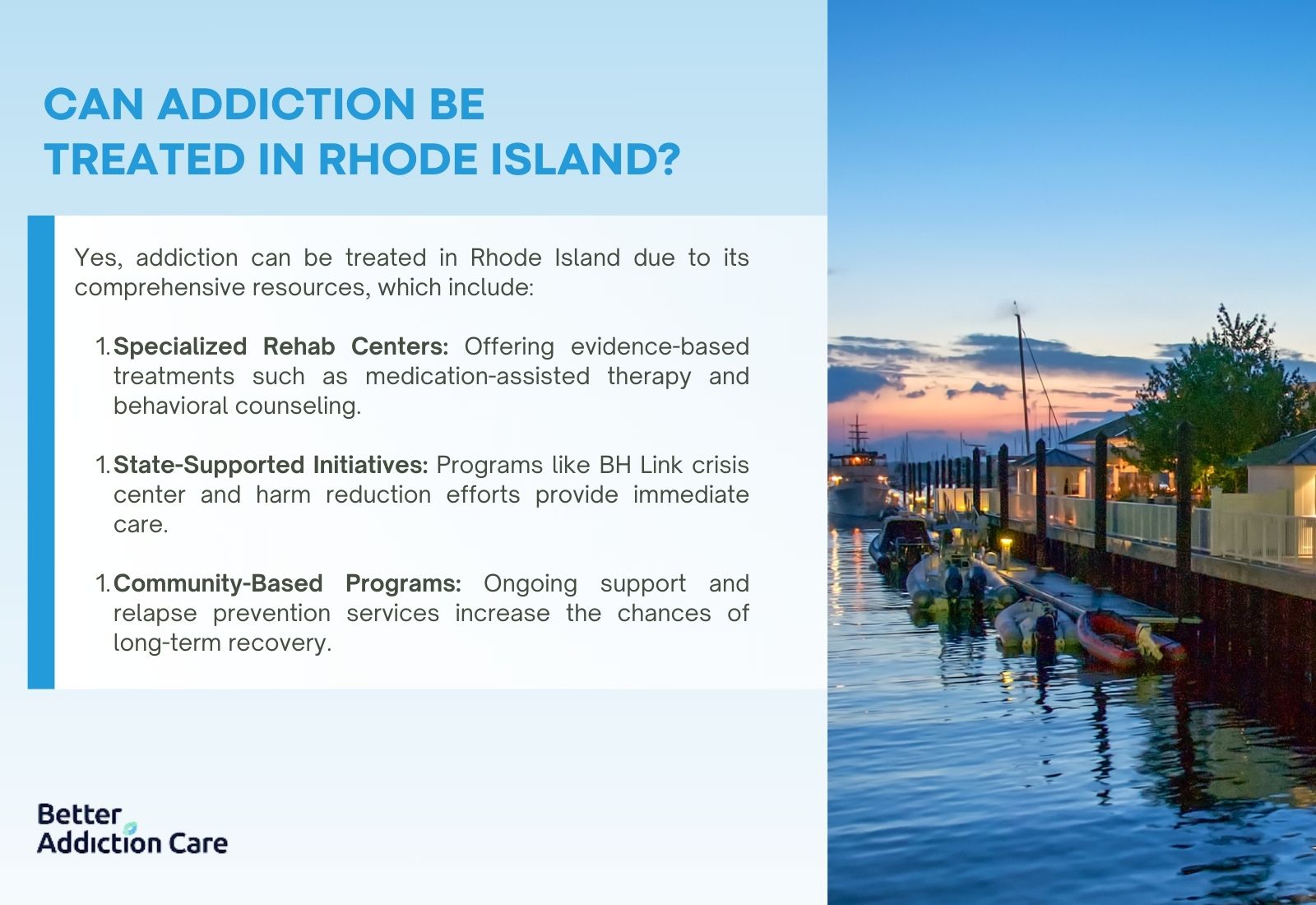
Thirdly, the state’s commitment to addressing addiction is evident in its growing network of community-based recovery programs, which provide ongoing support and relapse prevention services, enhancing the likelihood of long-term recovery.
What is the state of Rhode Island?
The state of Rhode Island is in the northeastern United States and is the smallest by land area. The state has a population of 1,097,379, with roughly 528,100 males and 569,279 females, reflecting a slightly higher number of women than men. Rhode Island is bordered by Massachusetts to the north and east, Connecticut to the west, and the Atlantic Ocean to the south. It also shares a water boundary with New York across the Narragansett Bay.
Economically, Rhode Island has a mixed profile. Rhode Island’s median household income is $81,370, which is close to the national average. However, it experiences pockets of economic disparity, with urban areas like Providence facing higher rates of poverty compared to wealthier suburban regions. Island’s economy is driven by healthcare, education, and tourism, but it also grapples with challenges such as income inequality and housing affordability.
What is the population of Rhode Island?
The population of Rhode Island is 1,095,962 residents. The gender distribution is fairly balanced, with females comprising 51.5% of the population and males accounting for 48.5%. Age-wise, the largest group is individuals aged 60 to 64 years, totaling 78,453 people, which represents 7.17% of the Island's population. In contrast, the smallest age group is those aged 80 to 84 years, with 21,999 individuals, making up 2.01% of the population. This demographic distribution indicates a relatively even gender balance and an aging population, with a significant portion of residents in the older age brackets.
What is the income of people from Rhode Island?
The income of people from Rhode Island is $43,324, per capita income, while the median household income stands at $81,370. Income levels vary notably across different age groups. Householders under 25 years have a median income of $43,688, which increases to $86,770 for those aged 25 to 44 years, and peaks at $100,530 for the 45 to 64 age group. For householders aged 65 and over, the median income decreases to $56,242. Gender disparities are also evident in income statistics. The median income for male full-time, year-round workers is $71,118, whereas female full-time, year-round workers earn a median income of $58,454, indicating a gender pay gap. These figures highlight the influence of age and gender on income distribution within Rhode Island.



